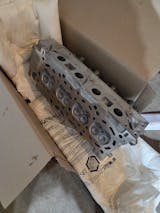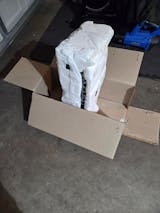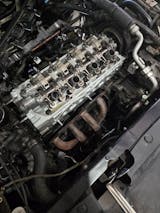You are not alone if you've ever looked under your car's hood and questioned the purpose of the round discs inside your engine block. Allied Motor Parts provides a detailed explanation about freeze plugs, which are essential components that protect your engine during extreme cold conditions. Knowledge about these tiny yet powerful components can help you avoid expensive repairs while maintaining your vehicle’s optimal performance. Every car enthusiast, from weekend mechanics to experienced technicians, needs to understand the function of freeze plugs.
Key Takeaways:
-
Freeze plugs block engine block openings to stop coolant leaks while protecting against damage from freezing conditions.
-
Freeze plugs function as protective barriers that pop out when coolant expands during freezing to prevent engine cracking.
-
Freeze plug failure often results from corrosion and improper coolant mixtures.
-
Engine longevity is maintained through regular inspections and high-quality replacement parts provided by Allied Motor Parts.
Core Plugs Are Freeze Plugs
Let’s clear up the lingo first: Different manufacturers and mechanics refer to freeze plugs as core plugs or welch plugs, or expansion plugs, but they all indicate a vital engine component. You need to understand these engine plugs, whether you are working on a classic Mustang restoration or maintaining your daily driver for extended engine life. Since engine production began, these components have demonstrated their reliability multiple times. Engine blocks become susceptible to leaks and damage without these essential but unremarkable plugs.
What Are Freeze Plugs?
Freeze plugs are essential. So, what is a freeze plug? Manufacturers install freeze plugs as small cylindrical discs made from steel, brass, or aluminum into designated holes throughout the engine block or cylinder head. Core holes are created to extract sand that remains after the engine casting process. After sand removal from the core holes, the sealing process begins using freeze plugs to fill those openings. Freeze plugs serve as barriers that seal off engine block openings, which helps maintain the cooling system's integrity and performance.
What Is a Freeze Plug on a Car?
The freeze plug functions as a cap that seals casting holes in a car engine to stop coolant from leaking out. They function like hidden pit crew members who silently protect your engine from overheating during operation. The absence of these plugs allows coolant to leak out, which then causes overheating and eventually leads to engine failure. Although they look unimportant, they play a vital role in keeping your engine healthy.
Engine Freeze Plug Purpose
So, what do freeze plugs do? The primary role of freeze plugs is to seal the engine coolant inside the system while ensuring proper temperature control and avoiding system leaks. Freeze plugs serve as safety valves during freezing conditions. When coolant inside the engine freezes and expands, freeze plugs pop out to relieve pressure, which helps prevent the engine block from cracking. These components become essential elements in engine design because they serve two critical functions, particularly in cold regions.
Freeze Plug Purpose in Pop Culture
The freeze plugs act as hidden protectors that prevent engine disasters during winter chase scenes with muscle cars. Much like James Bond gadgets, these freeze plugs operate out of sight until they become essential during critical engine moments. The hidden components that elevate iconic cars to fame function similarly to freeze plugs, which protect engines from major damage without drawing attention. Your favorite car ride would quickly break down without freeze plugs, even though they operate unseen as essential components.
Engine Block Freeze Plugs: Placement and Design
Engine block freeze plugs appear strategically positioned along the engine block sides, with additional placement on the cylinder head as needed. Their size and number vary depending on the engine design, but their purpose remains the same: to close the core holes in the engine block while creating a pressure release point to handle icy conditions. Engineers design the placement to provide optimal protection while preserving the structural integrity of the engine. The engineering design safeguards the engine block against standard operating demands as well as extraordinary stress scenarios.
How Freeze Plugs Fail
Freeze plugs can fail, and when they do, it’s a big deal. Let’s break down the main causes:
-
Corrosion: The coolant becomes acidic or contaminated over time, resulting in rust and corrosion. Corrosion from acidic or contaminated coolant gradually destroys the freeze plug, leading to leaks.
-
Improper Coolant Mixture: If you use plain water instead of the correct coolant mixture, your freeze plug engine protection may be compromised because it raises both freezing risks and corrosion potential.
-
Physical Damage: The freeze plug becomes more prone to failure when it experiences improper installation or impact during engine work.
The operating environment of freeze plugs inside the engine requires proper maintenance and high-quality coolant to ensure their long-lasting performance. Ignoring maintenance and coolant quality can escalate a minor leak into a significant problem.
What Happens When a Freeze Plug Fails?
A failed freeze plug typically dislodges from its seat when it malfunctions. The failure of the freeze plug results in a coolant leak through the cooling system, which can be seen as the engine's equivalent of a flat tire. Failure to detect this issue may result in the engine overheating or suffering extensive damage in severe situations. If a freeze plug fails, your engine will lose pressure, which results in decreased performance and possibly expensive repairs. Preventing these issues requires early detection followed by prompt replacement.
Symptoms of a Bad Freeze Plug
-
Coolant leaking from the side or bottom of the engine block
-
Overheating engine
-
Visible rust or corrosion around the plug area
-
Low coolant levels with no obvious leaks elsewhere
These symptoms often mimic other cooling system problems, so a thorough inspection is necessary. Catching these signs early can save you from a breakdown and expensive engine work down the road.
Freeze Plug Replacement: The Fix
The process of replacing a freeze plug lacks the excitement of installing a turbocharger, but remains equally important. A proper replacement requires draining coolant first, followed by old plug removal, before cleaning the hole and installing a new plug from a reputable provider such as Allied Motor Parts. (Shameless plug? Maybe. But we know our freeze plugs.) Installation needs to be correct in order to achieve a secure seal that provides durable protection. Choose high-quality freeze plugs and professional installation to ensure your engine remains protected for years.
Freeze Plug Engine Maintenance Tips
Want to keep your freeze plugs in top shape? Here’s how:
-
Use the right coolant mix: Always follow your vehicle manufacturer’s recommendations. Antifreeze provides protection against corrosion throughout the entire year rather than just during winter months.
-
Flush your cooling system: Perform a system flush every two to three years to eliminate old coolant and debris from the system.
-
Inspect regularly: Inspect your freeze plugs for any signs of rust or leaks whenever you change oil or work on your engine.
Maintaining freeze plugs through regular service leads to prolonged freeze plug life and enhanced engine performance. Preventing unforeseen breakdowns through proactive care ensures your car runs smoothly like a classic Chevy during a summer road trip.
Freeze Plugs in Car Culture
Although freeze plugs typically get less attention than superchargers or chrome headers, they perform a role just as crucial as the Millennium Falcon’s hyperdrive. Your engine would face the same grim fate as Dom Toretto’s vehicle post-high-speed chase if freeze plugs were absent. The engineering work done out of the spotlight creates automotive legends. Every time you see a sleek Camaro or hear a roaring Charger, remember the essential freeze plug working silently.
Frequently Asked Questions
Q: What is a freeze plug on a car?
The freeze plug serves as a metal disc that seals engine block casting holes to stop coolant leaks while allowing for a safety release during coolant expansion from freezing. This basic but essential part defends your engine against freezing temperature damage.
Q: What do freeze plugs do?
Freeze plugs retain engine coolant while serving as pressure relief valves to stop engine block cracking during freezing weather. The freeze plugs function to seal the core holes, which helps maintain the engine block's structural integrity.
Q: Can I drive with a bad freeze plug?
No, operating a vehicle with a defective freeze plug presents serious risks. A lost coolant situation can rapidly escalate to engine overheating and major damage. Fix freeze plug issues right away to prevent expensive future repairs.
Q: Are freeze plugs expensive to replace?
No, the parts have a low cost, but labor expenses for replacement will depend on where the plug is located. The accessibility of some plugs makes them easy to reach, whereas others demand extensive disassembly, leading to higher total expenses.
Q: Where can I get quality freeze plugs?
You can find a full range of high-quality freeze plugs at Allied Motor Parts. Check out our Freeze Plugs collection for the right fit for your engine. We pride ourselves on offering durable parts that meet or exceed OEM standards.
Final Takeaway
Freeze plugs may not have the star power of a V8 or the allure of a turbo, but they’re the silent sentinels of your engine’s health. At Allied Motor Parts, we know that every component matters, right down to the humble freeze plug. Whether you’re wrenching on a classic or keeping your daily ride on the road, don’t overlook these essential parts. Proper maintenance and timely replacement of freeze plugs can save you from engine headaches and keep your car running like a dream. For all your freeze plug needs, trust Allied Motor Parts to deliver quality, reliability, and expert support.
If you need advice or replacement parts, or just want to geek out about engine tech, Allied Motor Parts is your pit crew. Explore our Freeze Plugs collection and let’s keep your engine running smoother than a ‘70s Camaro on a Sunday cruise.








